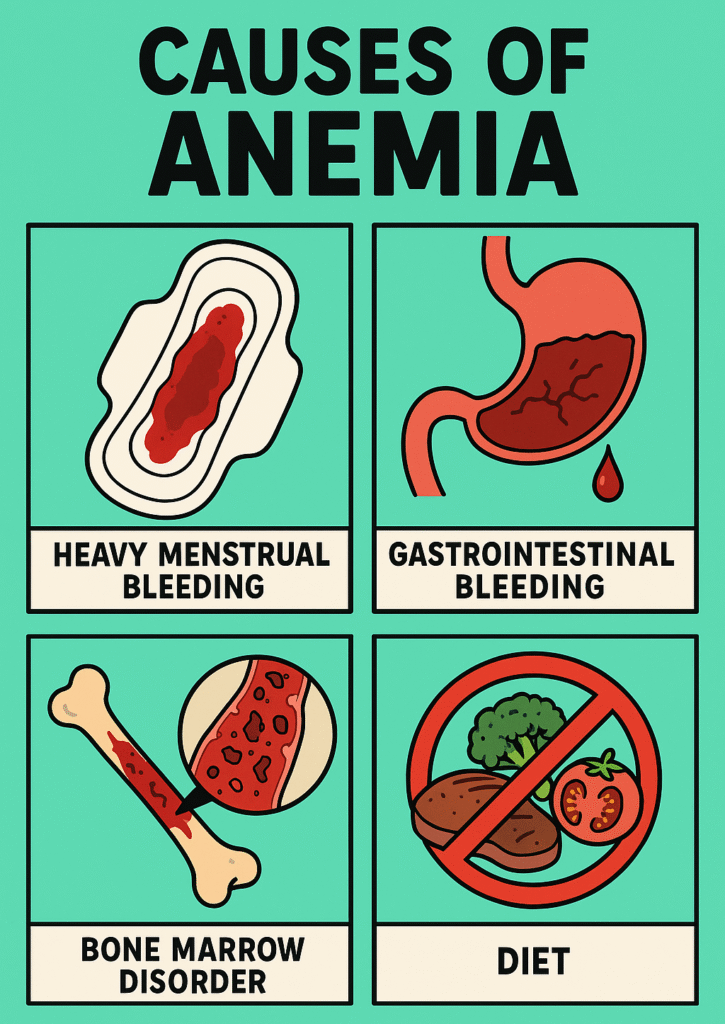What is Anemia?
Ever felt like you’re always tired no matter how much you sleep? Or maybe you get out of breath just from climbing stairs? These could be signs of anemia—a condition where your blood doesn’t have enough healthy red blood cells to carry oxygen to your body’s tissues. Simply put: not enough oxygen = tired body.
Anemia is one of the most common blood disorders globally. According to the World Health Organization, it affects over 1.6 billion people—that’s nearly 25% of the world’s population! It’s especially common among women, young children, and individuals with chronic diseases.
How Does It Happen? (The Mechanism Behind Anemia)
Think of your red blood cells like little delivery trucks, carrying oxygen using a protein called hemoglobin. When you have anemia, you either:
- Don’t have enough trucks (low RBC count)
- The trucks are broken (low-quality or deformed cells)
- Or, you don’t have enough fuel (low hemoglobin)
When oxygen isn’t reaching your muscles and organs efficiently, everything slows down—your energy, your focus, even your immune system.
What Are the Causes of Anemia?
There are many reasons why someone can become anemic. Let’s break them down:
🔴 Blood Loss (approx. 30–40%)
- Heavy menstrual bleeding in women
- Gastrointestinal bleeding due to ulcers, hemorrhoids, or cancers
- Injuries or surgeries
🔴 Decreased Red Blood Cell Production (approx. 30–35%)
- Iron deficiency anemia (most common type—up to 50% of all anemia cases)
- Vitamin B12 or folate deficiency
- Chronic diseases like kidney failure or cancer
- Bone marrow disorders (like aplastic anemia)
🔴 Increased Destruction of RBCs (approx. 10–15%)
- Autoimmune diseases
- Inherited disorders like sickle cell anemia or thalassemia

Who’s at Risk?
Anemia doesn’t just pop up randomly. Certain factors can raise your chances significantly.
Before listing them, ask yourself: Are you feeling more tired lately? Skipping meals? Bleeding often? These small clues matter.
Risk Factors:
- Women of reproductive age (due to menstruation or pregnancy)
- Poor diet lacking iron, B12, or folate
- Chronic illnesses like kidney disease, cancer, or inflammatory bowel disease
- Vegans/vegetarians not taking supplements
- Older adults, especially those with poor absorption
- Family history of anemia (especially sickle cell or thalassemia)
Symptoms of Anemia: What Should You Look Out For?
Many people mistake anemia for just being tired or stressed. But if you notice the following signs, it may be time to investigate:
- Fatigue (most common and persistent symptom)
- Pale or yellowish skin
- Shortness of breath, especially with exertion
- Dizziness or lightheadedness
- Cold hands and feet
- Rapid heartbeat or palpitations
- Headaches
- Brittle nails or hair loss
Why do these happen? Without enough oxygen, your heart works harder to pump what little it can. Your skin looks pale because of less red pigment in blood. And your muscles (including the brain) get sluggish, leading to tiredness and brain fog.
What Else Could It Be? (Differential Diagnosis)
Anemia shares symptoms with many other conditions. That’s why a good doctor always keeps a wide view.
Conditions That Mimic Anemia:
- Hypothyroidism: Fatigue, cold intolerance, weight gain
- Depression or anxiety: Low energy, poor focus
- Chronic fatigue syndrome
- Heart failure: Especially if shortness of breath is more severe
- Leukemia or lymphoma: May also cause fatigue and pale skin
It’s crucial to look at the full picture—history, blood work, and physical exam.
How Is Anemia Diagnosed?
Diagnosing anemia is straightforward—but figuring out why you have it? That’s the key.
✅ Gold Standard Test: Complete Blood Count (CBC)
This test measures:
- Hemoglobin level: (Normal is ~12–16 g/dL for women, 13–17 for men)
- Hematocrit: The percentage of blood made of red cells
- Mean Corpuscular Volume (MCV): Tells whether cells are small (microcytic), normal, or large (macrocytic)
Based on CBC, further tests may include:
- Iron studies (serum iron, ferritin, TIBC)
- Vitamin B12 and folate levels
- Reticulocyte count (young red cells)
- Peripheral blood smear
- Stool test for occult blood if bleeding is suspected
- Bone marrow biopsy, in rare or unclear cases
How Do You Treat Anemia?
Treatment depends entirely on the cause. Fix the root, not just the numbers.
🩸 Iron Deficiency Anemia (Most Common)
- Iron supplements (oral ferrous sulfate 325mg, taken 1–3 times daily)
- Vitamin C helps iron absorption
- Treat bleeding (heavy periods, ulcers, etc.)
If oral iron doesn’t work or is not tolerated:
- IV iron infusion
🧬 Vitamin B12 or Folate Deficiency
- B12 injections (for those with absorption issues)
- Folic acid tablets
🧬 Anemia of Chronic Disease
- Treat underlying condition (like kidney disease or inflammation)
- Sometimes, erythropoietin-stimulating agents (ESAs) are used
🩸 Severe or Sudden Anemia
- Blood transfusions
- Monitor closely for heart strain
🧬 Inherited Anemias (like thalassemia or sickle cell)
- May need lifelong monitoring, transfusions, or bone marrow transplant in severe cases
Take-Home Message
Feeling tired isn’t always just “life catching up with you.” Sometimes, your body is waving a red flag. Literally—your red blood cells.
If you notice any symptoms of anemia or belong to a high-risk group, speak to your doctor. Most causes are treatable, and catching them early can make all the difference.
References
- World Health Organization (WHO). Anaemia fact sheet. https://www.who.int/news-room/fact-sheets/detail/anaemia
- National Institutes of Health (NIH) – Iron Deficiency Anemia. https://www.nhlbi.nih.gov/health/iron-deficiency-anemia
- Cleveland Clinic. Anemia: Symptoms, Causes, Tests, Treatment.
https://my.clevelandclinic.org/health/diseases/3929-anemia - UpToDate. Approach to the adult with anemia. (Login required)
https://www.uptodate.com/contents/approach-to-the-adult-with-anemia
